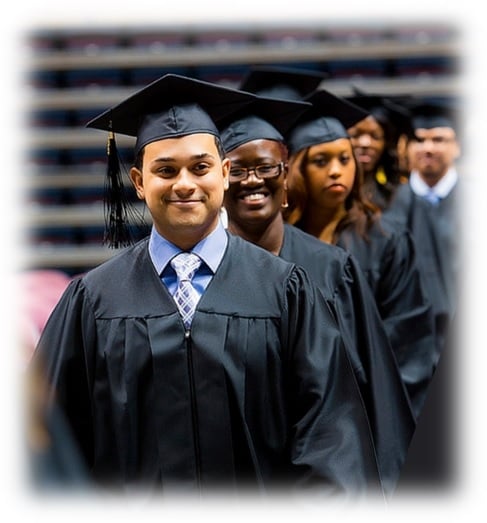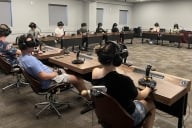You have /5 articles left.
Sign up for a free account or log in.

Many online learners attend their colleges' on-site commencement ceremonies.
Berkeley College
Many online-only students never step foot on campus, but like residential students, they develop a sense of community and pride in the colleges and universities they attend at a distance. That's why so many show up for their institutions' graduation ceremonies.
“This is the culminating moment that they’ve been dreaming about,” said Harold Blackmon, director of commencement services at the University of Maryland University College, where roughly 80 percent of the 9,500 online and hybrid students earned degrees this spring. “For some of them, [graduation] is almost not real until they get to commencement.”
Being present for the graduation festivities also allows online students to connect their digital experience to a physical place. “It’s something about the fact that it exists, that it's there,” said Paul LeBlanc, president of Southern New Hampshire University, a private institution that caters to online learners and where 13,000 online students graduated this month. "I think it matters to a lot of our students."
Because online-only learners often are older (their average age is about 35) and balancing jobs, families and other responsibilities, many have overcome major obstacles to reach graduation day.
“A lot of students have made a tremendous amount of personal and financial sacrifices to do this,” said Joshua Steele, director of online student success at the University of Arizona, where 10 of the 28 online degree earners attended the graduation ceremony this month. “They truly appreciate the experience, and sometimes it’s on us to help them understand how remarkable their accomplishments are.”
Connecting With Classmates, Faculty
Like traditional college students, online learners interact with classmates, participate in group projects, build relationships with instructors and work one on one with academic advisers. The main difference between the residential and distance education students is that online learners mainly communicate through digital formats, like email, online forums and video conferencing.
Commencement weekend offers an opportunity for online-only students to meet -- finally -- the college staff and faculty members they have often known for years but never greeted face to face.
“That [student-professor] relationship at Post University is very personal,” said Elizabeth Johnson, provost at the Connecticut-based for-profit university. Post had about 250 online students attend commencement in early May. [Faculty members and advisers] are encouraged to become more than an instructor -- they become a mentor, a career advocate, a cheerleader.”
Agreed LeBlanc: "We often say the secret sauce in our program is advisers. They become like life coaches and work with our students for the whole time.”
Many colleges host receptions ahead of the graduation ceremony so graduates can make in-person connections. For students meeting their classmates for the first time, this encounter can help make the rest of the weekend more enjoyable, Steele said.
The University of Arizona has open seating at its commencement ceremonies, which is wonderful for residential students who want to share the experience with friends and fellow graduates -- but it can put a lot of pressure on online students.
“When online students go in, you risk kind of feeling alone,” Steele said. “[The reception] is an opportunity for them to meet beforehand and then sit together” at the ceremony.
Receptions also provide graduates the opportunity to introduce their families to some of their biggest academic champions -- usually faculty members and assigned advisers. They also allow faculty members and advisers to meet the students' families, many of whom they’ve heard about for years.
“It makes them feel really special,” said Eric Friedman, director of the office of distance education at Boston University. BU expects more than 300 online students at its upcoming graduation, or about one third of its fully online students who will earn degrees this spring.
The Culminating Experience
For most people graduation day conjures a vivid image: students, clad in caps and gowns, walking onto a stage, shaking the hand of the college president or other official and then turning their tassels to the opposite side of their caps.
That is the very moment students work toward, regardless of whether they are taking classes online or on campus, Blackmon said. UMUC's post-commencement survey results show that, overwhelming, the reason online graduates participate in the ceremony is to receive their diplomas.
“It’s the moment they’re waiting for,” Blackmon said.
The in-person experience also provides graduates and their families a clear, concrete picture of what the students worked hard for, Friedman said.
“Actually getting an opportunity to cross the stage, shake the hand of the dean -- or whoever -- those things make them feel more connected to each other, to faculty, to Boston University,” he said. “It gives them that physical sense of completion.”
Almost all universities and colleges live stream their commencement ceremonies for those who can’t attend. Some, like Berkeley College in New Jersey, even have interactive virtual commencement ceremonies that include videos and speeches.
“We really want our students to feel connected and engaged with us, regardless of whether they are online or on-site,” said Sharon Goldstein, campus operating officer at Berkeley College, a for-profit institution catering to adult learners. “We want them, through the virtual commencement, to feel what they would feel if they were here. That’s how we run our entire [online] program.”
More than 700 online Berkeley students earned degrees this spring, with almost 300 attending the on-site ceremony.
Although live streams and virtual commencements are practical, they don’t replicate the experience of receiving the diploma in person, said Jill Buban, senior director of research and innovation at the Online Learning Consortium. “I don’t think there’s something that can take the place of that,” Buban said. “That’s such a moving moment and a milestone for all these learners.”
Friedman agreed: “To be in a crowd … and experience that energy -- you can’t do that online. They can be streaming the graduation, but it’s not the same.”
But that doesn't matter for many who've spent years completing courses online. Adult online students are often “second-chance learners,” said Ed Klonoski, president of Charter Oak State College, which only offers online classes. About 160 of the 500-student Charter Oak graduating class are expected to attend commencement in June. “Some of [our students] were military, had babies, got married, flunked out. The only way they got back on track was an act of will.”
That kind of determination deserves celebrating -- no matter the location, Klonoski and other college officials said.
“American culture, by and large, isn’t big on ceremony,” said LeBlanc. “But there’s something about key moments in life that deserve ritual and ceremony. Graduation is one of those.”








